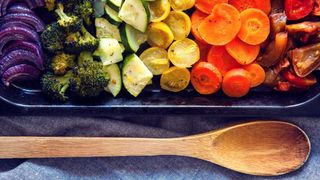How To Strengthen Your Immune System Through Your Diet
There’s no one food that’s going to make all the difference, but a healthy, balanced diet can keep it running smoothly

While it might sound like a good idea, in fact you do not want to boost your immune system. And you can’t.
“Nothing boosts your immunity and in fact it would be counterproductive to boost it, because what you want is your immune system to be functioning well and normally, not in overdrive – that can lead to other problems,” says Azmina Govindji, dietitian and consultant nutritionist, who works with the maker of KIND Snacks.
With that all cleared up, we asked Govindji to explain how you can best support your immune system with your diet.
How can your diet help your immune system?
A range of nutrients – that’s vitamins and minerals in the diet – all act together to support a normal immune function. The best way to optimise your immune system is to have a variety of foods from the main food groups: carbs, proteins, fruits and vegetables.
Having a variety of different-coloured fruits and vegetables, and different sources of nutrients, is more effective than taking a large dose of a herbal remedy or a single nutrient that promises to boost your immune system
What are the key vitamins and minerals to look out for?
Get the Coach Newsletter
Sign up for workout ideas, training advice, reviews of the latest gear and more.
There are several nutrients that are really significant. Vitamin C is an obvious one. So is vitamin A. Eating liver is a rich source of vitamin A, but that’s not a great delicacy in the UK, so our main intake comes from what we call carotenoids, like beta-carotene, which gives the orange-yellow colour to carrots and sweet potatoes, orange peppers and butternut squash.
Vitamin B6 is another one. You get it from fish, chicken and eggs mainly, but I really think it’s good to mention fortified foods like fortified breakfast cereals as that’s something that might be a staple. They contain those immune-supporting nutrients like B6 and folate. Some of them have iron, and you get zinc if they’re wheatgerm-based.
B vitamins, such as B6 and B12, are also in yeast extract which is a valuable source for vegetarians and vegans.
We don’t tend to talk about minerals much but copper is an important one. You find copper in breakfast cereals, nuts, including nut bars and nut butters, avocado, bread, rice, meat and fish.
Selenium is another, and brazil nuts are a great source of that. You also get it from fish, meat and eggs. And there’s zinc, which you get in meat and fish.
Another obvious one is vitamin D. It’s found in relatively few foods. The main source of the active type of vitamin D, which is vitamin D3, is what your body produces when it’s exposed to ultraviolet rays from the sun.
Can you get vitamin D from fortified foods?
The type of vitamin D that’s added to food is vitamin D2, which is not as effective as the potent vitamin D3 that we make in the sun. The regulations for food labelling are that if you want to say you’re fortified with vitamin D, you need to provide 15% of the daily vitamin D requirements. You still have to get that 85% from somewhere else, so my personal view is that it’s almost impossible to meet your vitamin D needs from fortified foods. Sunshine and supplements, especially in the UK, are really important.
See related
- How Much Time Should You Spend In The Sun To Get Vitamin D (And Avoid Skin Cancer)
- The Best Vitamin D Supplements And Vitamin D Explained
- What Are The Risks Of A B12 Deficiency For Vegans And Vegetarians?
What other advice would you give when it comes to supporting your immune system through your diet?
Variety is key. More wholegrains, more pulses, beans, vegetables, fruits, nuts and seeds. These are all whole plant-based foods, which are associated with providing you with more immune-supporting nutrients like vitamin A, B vitamins, and copper from the nuts.
I would say the best way to change your diet to bolster your immune system is to gradually move towards including more plant-based foods. You don’t need to become vegan, but try to incorporate more lentils, beans, nuts and seeds into your diet to get those immune-supporting nutrients.
Should you alter your diet as you get older to support your immune system?
One thing that happens when you get older is that your appetite goes down. What that means is that you’ve got less capacity to get the wide range of nutrients that you want for your immune system. You have to be careful to make sure that everything you eat is going to provide you with these essential vitamins and minerals.
The other thing as you get older is that you tend to be more housebound, and to go back to vitamin D, where are you going to get the exposure to sunshine? It’s crucially important for older people to go for a walk or to sit in the garden and uncover parts of their arms and legs, and to take a supplement. The government recommends 10 micrograms of vitamin D daily, especially during winter months.

Nick Harris-Fry is a journalist who has been covering health and fitness since 2015. Nick is an avid runner, covering 70-110km a week, which gives him ample opportunity to test a wide range of running shoes and running gear. He is also the chief tester for fitness trackers and running watches, treadmills and exercise bikes, and workout headphones.
